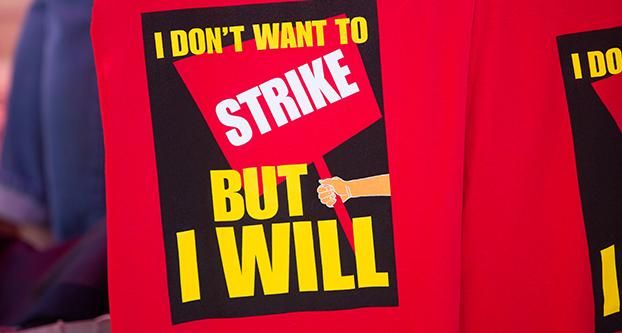The union representing 23,000 faculty across the 23-campus California State University system announced Wednesday that more than 94 percent of its members voted to strike if ongoing labor negotiations between the two parties fail.
At the heart of the labor negotiations is how much of a raise faculty should receive from the CSU. The California Faculty Association wants a 5 percent increase, while the CSU proposed a 2 percent increase.
The vote gives the statewide CFA executive board the power to call for job actions up to and including a strike.
“It’s one thing to ask us to tighten our belts during hard times because we want to serve our students — and we’ve done that,” union President Jennifer Eagan said during Wednesday’s news conference at San Jose State. “But the recession is over, the governor and the Legislature have reinvested in the CSU, and now is the time for us to be able to catch up.”
Diane Blair, a Fresno State communication professor and the CFA campus chapter president, said that the vote sends a strong message to CSU Chancellor Timothy White.
“The Chancellor has publicly acknowledged that there was a disinvestment in faculty during difficult budget years, and I think a 94.4 percent ‘Yes’ vote sends a strong message to the Chancellor that it is time to demonstrate that reinvesting in faculty is indeed a priority for him.”
“I also think this strike vote ultimately demonstrates faculty’s unity and commitment to the well-being of our families, our university community and the future of the CSU,” Blair added.
The union, which represents professors, lecturers, librarians and counselors, has made its case this year in a series of reports highlighting the financial struggles of CSU professors throughout the university system.
The reports called attention to the plight of lower-paid temporary lecturers — who in recent years have grown to more than half of CSU faculty — as well as to figures showing inferior earnings growth compared with increases enjoyed by faculty in the University of California system and other public universities around the country.
Kevin Wehr, chairman of the union’s bargaining team, said management has looked bored and distracted during negotiations.
“Maybe a 94.4 percent strike vote will get their attention,” Wehr said. “Their 2 percent pittance is insulting.”
The CSU released a statement that said that the university system “remains committed to the collective bargaining process and reaching a negotiated agreement with the CFA.”
Blair said a strike would not happen until the start of spring semester and will only happen if the union can’t reach a resolution with White and if he chooses to impose a contract.
“A strike is always the last resort,” Blair said.
Blair isn’t sure yet what the strikes would look like, but alluded to past strike discussions.
“In the past, when we’ve been at this point, we’ve talked about doing, for instance, rolling strikes on campuses,” Blair said. “Where you shut a campus down one day and then you move to the next campus and shut it down.”
Blair said those kind of strikes would impact students in the short term, but other actions could greatly impact students as well.
“If we decide that we need to shut a campus down and keep it shut down, then it has greater implications for students,” Blair said.
“Again, that’s why it is the last option for us. It’s not something that we really want to do, but we do feel like student learning conditions are intimately connected to faculty working conditions,” Blair added.
The two parties are currently under the fact-finding process. The CSU’s Labor Relations Department released a statement that explains the process:
“The fact-finding panel, consisting of a neutral party and representatives from both the CSU and CFA, will hear evidence from both parties and make a nonbinding recommendation. Once released, the fact-finding report remains confidential for 10 days, and then is made public.”
Fact finding hearings are planned for Nov. 23 and Dec. 7.
The union’s proposal would cost nearly $102 million a year, including $82 million for the 5 percent increase, according to CSU spokeswoman Laurie Weidner.
Faculty says CSU has the money — it received $217 million more from the state this year as California restores funding it slashed from colleges during the Great Recession — and that it should direct more of its funding to faculty, rather than to administrative salaries.
But White — who visited San Jose State Wednesday to meet with students and faculty — noted during a public forum that the university system still has about $200 million less than it did in 2008, when the U.S. economy went into a tailspin.
“With high demand and high needs, we have to live within our means,” White told the audience.
Still, White said he was concerned about faculty pay and urged employees to trust his commitment to raising it. CSU says it has devoted nearly $66 million to professors’ raises in the past two years and, that it hired 742 tenure-track faculty members last year.
Katy Murphy of the Tribune News Service contributed to this story.




